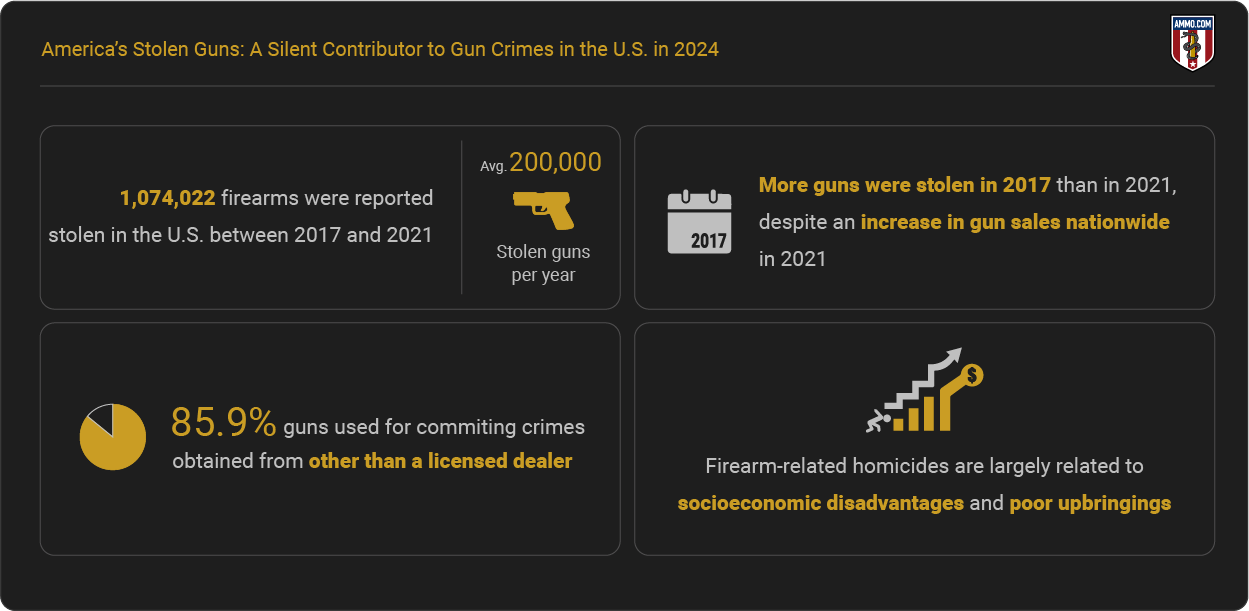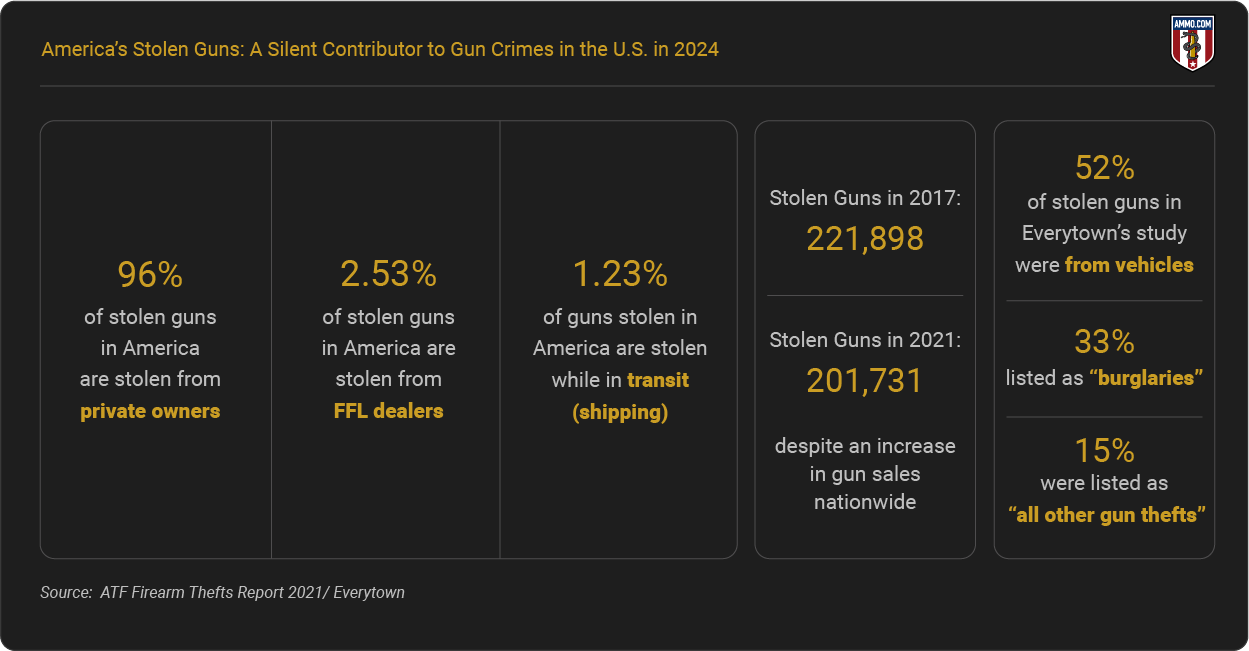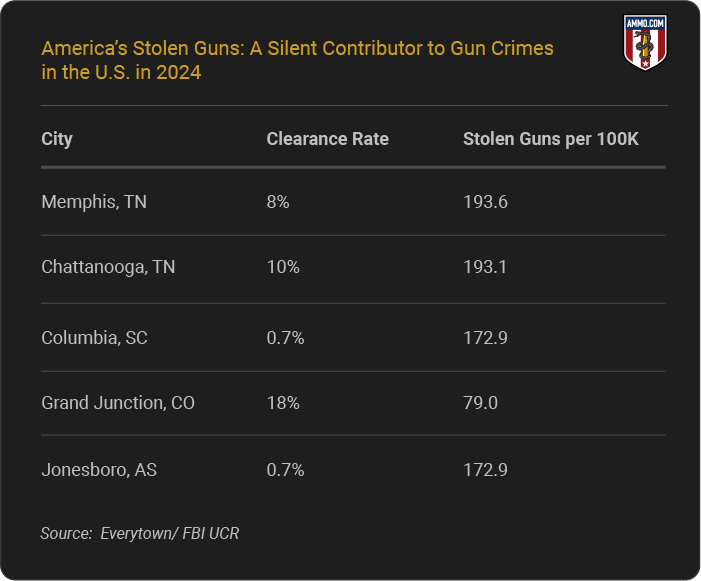America’s Stolen Guns: A Silent Contributor to Gun Crimes in the U.S. (2024)
The issue of guns in America mainly arises from stolen firearms, as it's uncommon for lawful gun owners to commit crimes. However, in America, being a victim of gun theft is unique because victims are often blamed for making themselves vulnerable to criminals.
1,074,022 firearms were reported stolen in the U.S. between 2017 and 2021, which equates to an average of 200,000 per year.
There were more guns stolen in 2017 than in 2021, despite an increase in gun sales nationwide in 2021.
85.9% of those possessing a firearm, when they committed their crimes, purchased or obtained the firearm from somewhere other than a licensed dealer.
Firearm-related homicides are largely related to socioeconomic disadvantages and poor upbringings.
The data provided offers a thorough understanding of stolen guns in the U.S. and suggests ways to enhance crime prevention through sensible measures. For a detailed list of our sources, please refer to the comprehensive list provided here.

Understanding Stolen Guns in America
Between 2017 and 2021, a total of 1,074,022 firearms were reported stolen in the U.S., averaging around 200,000 annually. However, these figures are estimates, as criminals typically do not report their illicit activities to law enforcement agencies for research purposes.
While this number seems exceptionally high, the truth is that less than a fraction (only 0.042%) of civilian-owned firearms in the United States are stolen each year. Therefore, it is safe to say that the vast majority of gun owners are, in fact, taking precautions to ensure thieves do not acquire their property.
Stolen guns in America are used in a significantly higher number of crimes than legally purchased firearms. However, many stolen guns are never used in crimes.
Diagnosing firearm theft is challenging due to reporting issues. However, according to an Everytown study based on FBI data that is no longer available, firearm theft from vehicles began surpassing firearm thefts from burglaries in 2014, years before many states passed open carry legislation.
When a thief takes a firearm from an unsuspecting victim, it becomes nearly impossible to track until it is recovered after a crime or when police recover it during a traffic stop.
Here are the things you need to know about stolen guns in America:

[Citations: ATF Firearm Thefts Report 2021/Everytown]
Stolen Guns Used in Crimes
Only 10% of stolen guns are used in crimes annually, but 43.2% of criminals who used a firearm in the commission of a crime purchased it from an underground dealer. Furthermore, 20% of inmates who committed a crime with a firearm reportedly obtained a firearm solely for the purpose of committing a crime.
Despite rhetoric about gun shows, firearms purchased from gun shows are the least likely to be used in crimes (0.8%), and those purchased from an FFL dealer by the offender are used in only 1.3% of crimes.
In total, 85.9% of those in possession of a firearm, when they committed their crimes, purchased or obtained the firearm from somewhere other than a licensed dealer. Combined with what we already know about stolen guns, it’s safe to say that thieves are contributing to gun-related crimes in America. [Citation: Source and Use of Firearms in Crimes: Survey of Prison Inmates in 2016]
Contrary to some assumptions, the rate of legal firearm owners, state and federal legislation, and the number of legal guns do not increase homicide rates. However, there is a clear correlation between the prevalence of stolen guns and increased homicide rates.
A 2021 study assessed possible correlations between the number of FFL dealers, big box stores that sell firearms, poverty, race, policing, and disadvantaged individuals with homicide rates to better understand the relationship between guns and crime.
The study showed that the incidence rate ratio (IRR) of illegal firearm availability was higher than the legal firearm rate availability in high gun crime areas. Furthermore, areas with more disadvantaged individuals also had higher rates of gun-related crimes.
Therefore, stolen guns and socioeconomic disadvantages create an environment that fosters gun crime victimizations despite stringent legislative restrictions and legal firearm availability.
Guns & Socioeconomic Disadvantages
According to a 2021 study, 87% of 330 individuals aged 16-24 in disadvantaged neighborhoods have carried firearms. 82% stated that they carry because it makes them feel powerful, 77% cited personal safety, and 26% stated they felt respected because they had a firearm.
Now that we know the correlation between high-crime areas and illegal gun availability, we must explore the market for illegal firearms in these areas.
The majority of gun owners in this study (63%) stated they first obtained a firearm between the ages of 14 and 17 years old. The top sources for these firearms were friends, family members, and gang members, according to the study.
While this doesn’t tell us exactly how many guns were stolen, it does show us the market for firearms in high-crime neighborhoods where they’re less likely to be obtained legally.
Inner-city youth who feel unsafe, are exposed to gangs, and are influenced by pro-gun culture have fewer opportunities to protect themselves and obtain firearms legally. Therefore, it stands to reason these areas create an opportunity for gun thieves to profit.
Stolen Guns Risk Factors
In April of 2024, two teenagers were caught pulling on car door handles in the middle of the night in Chattanooga, Tennessee. One of the sixteen-year-old boys was wearing body armor and possessed a stolen gun. This story is common in the small urban city. In fact, Chattanooga, Tennessee, has had more guns stolen from vehicles per capita than nearly any other city in the United States in recent years.
Despite curfews, Ring cameras, and policing, the epidemic of stolen guns from vehicles has exploded in recent years. So, what’s going on?
Many claims assume that stolen guns are uniquely a weak gun law problem or a gun ownership problem. However, when we expand the issue across all fifty states, gun laws, and ownership rates don’t show a consistent correlation when you look at the number of stolen guns in an area.
We do however notice a correlation between low clearance rates and gun theft.
For example, Chattanooga, TN, Memphis, TN, and Columbia, SC, comprise the top three cities for stolen guns from vehicles. These cities also have lower clearance rates than other cities with fewer stolen guns.

[Citations: Everytown/FBI UCR]
Stolen Guns in America
Criminals are far more likely to purchase a stolen firearm from an unauthorized dealer than they are to steal one themselves. Therefore, it stands to reason that there’s a market for stolen guns, and many thieves are taking advantage of that.
While areas with many legal guns tend to have lower crime rates, inner-city areas with higher rates of crime tend to create a profitable market for stolen guns. When individuals feel unsafe in an area and have no means to protect themselves lawfully, they may resort to illegal and stolen guns for protection.
The stolen gun issue is further compounded by low clearance rates and too few officers to combat growing crime problems in urban areas.
Sources
- Clearance Rate Data
- BJS Report on Source of Guns Used in Crimes 2016
- Everytown Study on Stolen Guns
- ATF Analysis of Stolen Guns
- 2021 Study on Guns in Disadvantaged Neighborhoods
- Illegal Firearm Availability 2021
Infographics
- Are Guns & Ammo The New Gold? Why More Americans Are Arming Themselves
- The Greatest Gun Salesman In America: President Barack Obama
- Shooting Straight: How Both Presidential Candidates Have Changed On Gun Control
- President Obama: (Still) The Greatest Gun Salesman in America
- An Inconvenient Truth: How The Obama Administration Became Earth's Largest Arms Dealer
- Armed Drones: President Obama's Weapon of Choice
- COVID-19 Data Study: Ammunition Sales Continue to Soar in Response to Coronavirus Panic
- Data Study: 18 Months of Ammo Sales during a Pandemic, Protests, and the Biden Presidency
- Data Study: U.S. Ammo Sales Surge Following Russian Invasion of Ukraine
- Most Gun-Friendly States in 2024
- Worst States to be a Gun Owner (2024 Updated)
- Children & Firearms: Definitions and Demographics Make All the Difference
- Urban Violent Crime & Legal Gun Ownership
- Gun-Free School Zone Laws & School Shootings (2024 Updated)
- Gun Control Laws and Enforcement Trends 2024
- Gun Ownership by State (2024 Statistics)
- How Many Gun Owners are in America? (2024 Statistics)
- Concealed Carry Crime Stats 2024
- Accidental Shooting Statistics: A Review of Unintentional Firearm Deaths from 1979-2024
- America’s Stolen Guns: A Silent Contributor to Gun Crimes in the U.S. (2024)
- Gun Violence Statistics 2024: Comprehensive Look at the Data
- Gun Laws vs. Crime Rates in 2024: A Comprehensive Analysis
- Gun Death Statistics by Caliber: A Review of Calibers and Crime in 2024
- Anti-Gun Control Arguments 2024: Facts Gun Control Lobby Suppress
- Guns in the Home Statistics: The Effects of Firearms in the Home in 2024
- Gun Deaths in the US: Analyzing At-Risk Demographics in 2024
- How Many Guns in the U.S.: All About America’s Firearms in 2024
- Gun Facts in the U.S. 2024: The Reality of Firearms in America
- Defensive Gun Use Statistics: America’s Life-Saving Gun Incidents (2024)
- Correlation Between Mass Shootings and Prescription Drugs (2024 Study)
- Gun Ownership by Gender in 2024: Closing the Gender Gap
- Murders by Weapon Type: September 2024 Statistics
- Gun Violence Among Black Americans: September 2024 Statistics
- The Ultimate Hunting Caliber Chart: Best Cartridge Per Species
- How Old Do You Have to be to Buy a Gun: A State Guide 2024
- Most Popular Guns in the U.S.: The Must-Have Guns in 2024
- Stray Bullet Deaths: Accident and Injury Statistics in September 2024
- Mass Shooters by Race: Demographics of Assailants 1966-2024
- Ammunition Limits By State in 2024: How Much Ammo Can You Buy?
- Why Do Americans Own Guns in 2024?
- How Many Americans Want Stricter Gun Laws in 2024?
- How Many Households in the U.S. Have a Gun in 2024?
- What Percentage of Gun Deaths are Suicides in 2024?
- Average Age of Mass Shooters in the U.S.
- Firearm Ownership in America by Year
- US Firearms Deaths Per Year: A Collective Report 1968-2024
- Percentage of Americans Owning Guns in 2024
- Texas Gun Ownership: Total Numbers, Trends, and Most Popular Guns
- Gun Ownership Statistics Colorado 2025: Trends & Numbers
- Hunting Accident Statistics 2025 (Causes & Trends Per Year)
- Banned Guns & Ammo List: A 2025 Review by State
- 3D Printed Gun Laws By State
- How To Build a Home Shooting Range: The Ultimate Guide
- States With the Highest Murder Rates
- Best Self-Defense Weapons for Women
